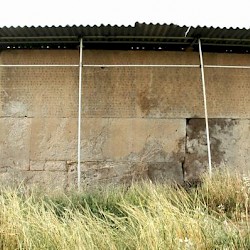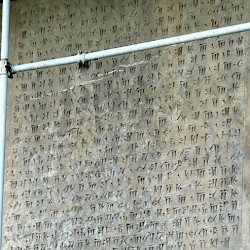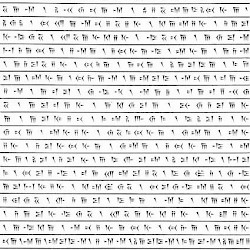DPe
Achaemenid Royal Inscriptions: collection of Old Persian cuneiform texts from the sixth, fifth, and fourth centuries BCE, left by the Achaemenid kings on their official monuments.
[In the following text, to be found on the terrace wall of Persepolis, Darius tells about the size of his empire. It is the sequel of DPd, in which he prayed for protection. (There are similar inscriptions in Elamite and Babylonian, DPf-g.)]
 Persepolis, Terrace, Southern wall, Inscriptions DPd-e |
 Persepolis, Terrace, Southern wall, Inscription DPe |
 DPe (drawing) |
- adam \ Dârayavauš \ xšâyathiya \ vaz
- raka \ xšâyathiya \ xšâyathiyânâ
- m \ xšâyathya \ dahyûnâm \ tyai
- šâm \ parûnâm \ Vištâspahyâ \
- puça \ Haxâmanišiya \ thâtiy \ Dâra
- yavauš \ xšâyathiya \ vašnâ \ Aurama
- zdâhâ \ imâ \ dahyâva \ tyâ \ adam
- \ adaršiy \ hadâ \ anâ \ Pârsâ \ kâ
- râ \ tyâ \ hacâma \ atarsa \ manâ \ bâj
- im \ abara \ Ûvja \ Mâda \ Bâbiru
- š \ Arabâya \ Athurâ \ Mudrây
- â \ Armina \ Katpatuka \ Sparda \ Ya
- unâ \ tyaiy \ uškahyâ \ utâ \ tya
- iy \ drayahyâ \ utâ \ dahyâva \ t
- yâ \ para \ draya \ Asagarta \ Parthava \ Zra
- ka \ Haraiva \ Bâxtriš \ Suguda \ Uv
- ârazmîy \ Thataguš \ Harauvatiš \ H
- iduš \ Gadâra \ Sakâ \ Maka \ thâtiy
- \ Darayavauš \ xšâyathiya \ yadiy
- \ avathâ \ maniyâhay \ hacâ \ aniya
- nâ \ mâ \ tarsam \ imam \ Pârsam \ kâram \ pâdi
- y \ yadiy \ kâra \ Pârsa \ pâta \ ahatiy \ hyâ \
- duvaištam \ šiyâtiš \ axšatâ \ hauvci
- y \ Aurâ \ nirasâtiy \ abiy \ imâm \ vitham
I am Darius the great king, the king of kings, the king of many countries, the son of Hystaspes, an Achaemenid.
By the favor of Ahuramazda these are the countries which I got into my possession along with this Persian people, which felt fear of me and bore me tribute : Elam, Media, Babylonia, Arabia, Assyria, Egypt, Armenia, Cappadocia, Lydia, the Greeks who are of the mainland and those who are by the sea, and countries which are across the sea, Sagartia, Parthia, Drangiana, Aria, Bactria, Sogdia, Chorasmia, Sattagydia, Arachosia, Hinduš, Gandara, Sacae, Maka.
King Darius: If you think, "I fear no one else," than protect the Persians. Because when the Persians are protected, their happiness will remain unbroken, and the favor of Ahuramazda will come down upon the royal house.
Literature
- Pierre Lecoq, Les inscriptions de la Perse achéménide (1997 Paris)